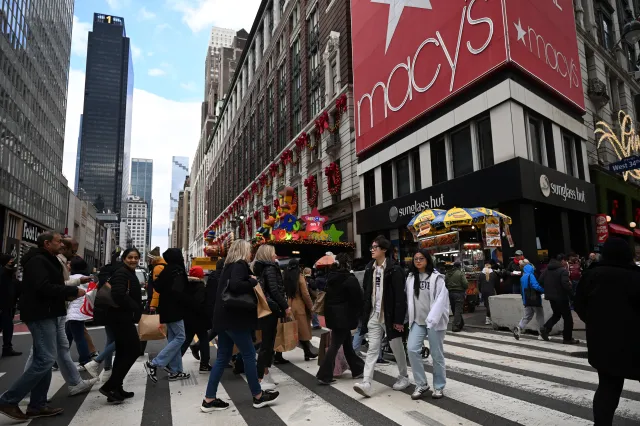-
A Hong Kong Fire Survivor’s Escape, in His Own Words - 13 mins ago
-
Aldi recall: Customers told discard Christmas products ‘immediately’ - 37 mins ago
-
Officials Had Been Warned for Over a Year Before Hong Kong Fire - 57 mins ago
-
Neighbors Spend Months Trying To Save Stray Dog, Get ‘Thanksgiving Miracle’ - about 1 hour ago
-
Andriy Yermak, Zelensky’s Chief of Staff, Resigns - 2 hours ago
-
All In With Ashley: NFL Rankings Thanksgiving Special - 2 hours ago
-
Shelter Dogs Receive Special Thanksgiving Gift, Their Response Is Adorable - 2 hours ago
-
‘Hey, Lemonade!’: A Backstage Fixture at the Grand Ole Opry - 2 hours ago
-
Program giving $500 monthly checks to Americans extended - 3 hours ago
-
Trump Says U.S. Will Pause Migration From ‘Third World Countries’ After D.C. Shooting - 3 hours ago
New ‘cash law’ could change shopping for millions
New York shoppers will soon face one less barrier at the checkout, as a newly signed law forces merchants to accept cash payments.
Last week, as per the New York State Senate website, Governor Kathy Hochul signed a bill “prohibiting food stores and retail establishments from refusing to accept payment in cash.”
Why It Matters
The covid pandemic accelerated what has long been seen as an inevitable transition toward a cashless society, with both merchants and consumers expressing an increasing preference for touchless payment options. Many businesses have adjusted accordingly with some now even refusing to accept cash as payment, prompting the introduction of this bill, but research shows many Americans, particularly older and lower-income consumers, still rely on cash for their daily transactions, according to The Federal Reserve.
A report from the Atlanta Federal Reserve Bank, published in May, found 83 percent of adults used cash to make a purchase in the previous month. Meanwhile, the American Consumer Institute has highlighted the contemporary benefits of cash transactions for both merchants and customers, citing the avoidance of interchange fees and potential card surcharges, and argued that it serves as an “expression of consumer choice.”

What To Know
Bill A.7929A/S.4153A was introduced in April of this year, sponsored by Democrats James Sanders in the Senate and Assemblywoman Catalina Cruz. As well as prohibiting establishments from refusing to accept cash, the bill prevents businesses from levying additional fees or surcharges on cash payments compared to cashless transactions.
The bill passed easily through the state Senate and Assembly, with the most recent floor vote totaling 53 in favor and three against, with one absent and 6 excused. And thanks to Governor Hochul’s signature, New York now joins the handful of other states have adopted cash protection measures in some form.
In 2019, New Jersey effectively banned cashless establishments. Colorado enacted a similar measure two years later, requiring retailers to accept cash for goods or services with limited exemptions.
And a bill currently being considered by lawmakers in Ohio would require businesses to provide at least one point-of-sale location which accepts cash for transactions of $500 or less.
What People Are Saying
New York Assemblywoman Catalina Cruz, one of the bill’s sponsors, posted to Instagram in April: “Too many stores are going cashless, shutting out seniors, immigrants, and working-class New Yorkers who rely on cash every day. Our bill makes it clear: retailers and food stores can’t refuse cash—because access to essentials shouldn’t depend on a credit card.”
Republican State Senator Joseph Griffo, in an appeal to Hochul in August, said: “An overwhelming majority of New Yorkers support this proposal. They want to be able to choose for themselves how they pay for goods or services. I am hopeful that the majorities will quickly send this bill to the governor for her consideration and that she will sign it into law because cash should be an option everywhere.”
What Happens Next
The bill’s text states it will become active “on the one hundred twentieth day after it shall have become a law,” meaning it will take effect in March 2026.
Source link


















